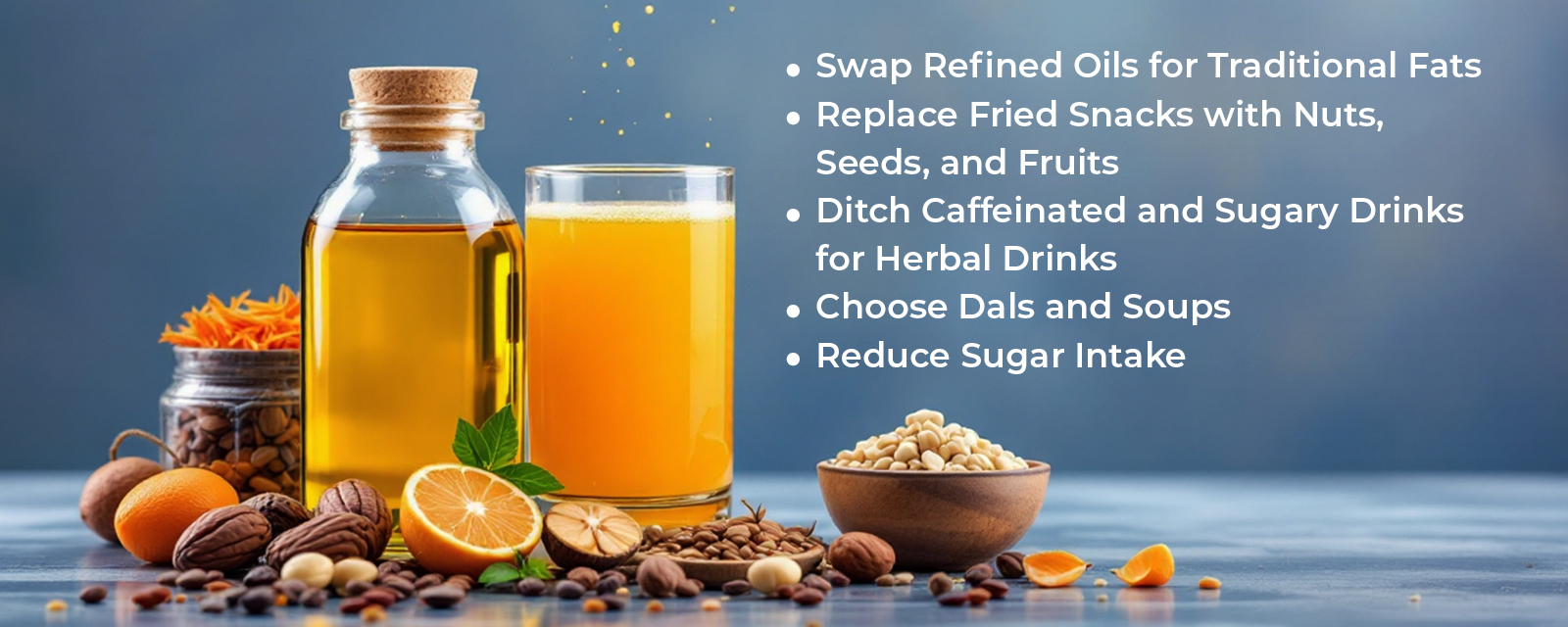
India is one of the most polluted countries worldwide, and air pollution has now become a national health emergency.
As winter sets in, major Indian cities remain in “unhealthy” to “very unhealthy” AQI categories, with PM2.5 levels very high. (1)
If you look at the early morning sky, the smog levels are so high that they cause cough, allergies, sinus irritation, breathing difficulty, and constant fatigue.
While air purifiers, masks, indoor plants, and having an active lifestyle can save you, your most powerful line of defence may actually be your daily diet.
Foods for lung health can help you build a solid immunity and help your body cope with polluted air, inflammation, and oxidative stress.
In this blog, we give you some winter smog health tips to make a meaningful difference in your overall health.

1. Swap Refined Oils for Traditional Fats
Most families use refined vegetable oils like sunflower, soybean, or canola, which are high in omega-6 fatty acids.
When your body is actively fighting pollutants, inflammation is the last thing it needs, and refined seed oils supply that in surplus.
Winter smog puts a heavy load of toxins on your lungs and liver, making fats helpful in reducing inflammation naturally.
Choose cold-pressed coconut oil, mustard oil, and desi A2 pure cow ghee to provide the nourishment your body is craving.
Traditional fats are anti-pollution foods as they are stable at higher temperatures and contain antioxidants that support healthy lung and liver function.
A 2020 study in Frontiers in Nutrition found that people exposed to particulate pollution had lower airway-inflammation markers due to having diets rich in omega-3 and monounsaturated fats.
2. Replace Fried Snacks with Nuts, Seeds, and Fruits
A polluted environment elevates oxidative stress, an immune process that can damage your cells and weaken your shield.
Fried foods, especially ultra-processed ones, can worsen inflammation and slow the essential detoxification process.
Having a nutrient-dense snack can strengthen your lung resilience and protect those cells by lowering oxidative stress.
Choose walnuts, flaxseeds, cashews, almonds, pumpkin seeds, and seasonal fruits like oranges, guavas, and amla.
These are the best foods for air pollution are rich in vitamin A, E, C, selenium, and omega-3 fatty acids (AHA), all proven to reduce inflammation and support better lung capacity.
3. Ditch Caffeinated and Sugary Drinks for Herbal Drinks
Dehydration is a common issue when you have congestion, cough, and dryness due to pollution.
Caffeinated drinks like masala tea & coffee or sugary drinks can strain the liver and spike inflammation, reducing your body’s ability to process airborne toxins.
Switch to herbal drinks like kadha, tulsi tea, amla juice, aloe vera juice, or turmeric milk to significantly improve respiratory comfort.
A 2022 Journal study found that tulsi and turmeric extracts are natural ways to detox lungs as they improved the respiratory pathway and reduced inflammation in individuals living in polluted environments.
These are the best foods for air pollution are rich in vitamin A, E, C, selenium, and omega-3 fatty acids (AHA), all proven to reduce inflammation and support better lung capacity.
4. Choose Dals and Soups
Most people like having deep-fried foods in winter, but frying in refined oils can increase inflammatory compounds that burden the lungs and liver.
In contrast, dals like tuvar, mung, masoor, and soups like moringa, tomato can hydrate and lighten your digestive load while offering collagen and amino acids that support tissue repair.
5. Reduce Sugar Intake
Refined sugar causes high glucose levels, oxidative stress and can suppress immune function for hours, creating a double burden during polluted months.
Even if you use jaggery or dates, it still has a higher glycaemic index. The best way is to reduce the amount of sugar you intake, whether it’s refined or sulfur-free, both will have similar effects.
You can also try monk-fruit sweetener and stevia after careful research and your personal preferences.
The Bottom Line
Your lungs, liver, and skin already work tirelessly to detoxify pollutants - but they need support of antioxidant-rich foods.
These high AQI health tips can significantly improve how your body handles the winter air.
This winter pollution diet simply provides the much-needed boost to strengthen your immune system against the high AQI in our cities.
Pollution also affects the nutrient absorption in crops and chemical fertilizers can worsen the nutrients. Buy organic food to support overall health.
Explore More From Naturopedia
Are You at Risk of Heart Disease? Study Links These Foods to a Healthier Heart
What Really Happens When You Shower Right After Eating?
Why Your Desk Job Is Hurting Your Joints (And 7 Fixes You Need Today)
Top 10 Health Goals for 2026: Stay Healthy, Happy & Strong This Year
January 1st, 2026